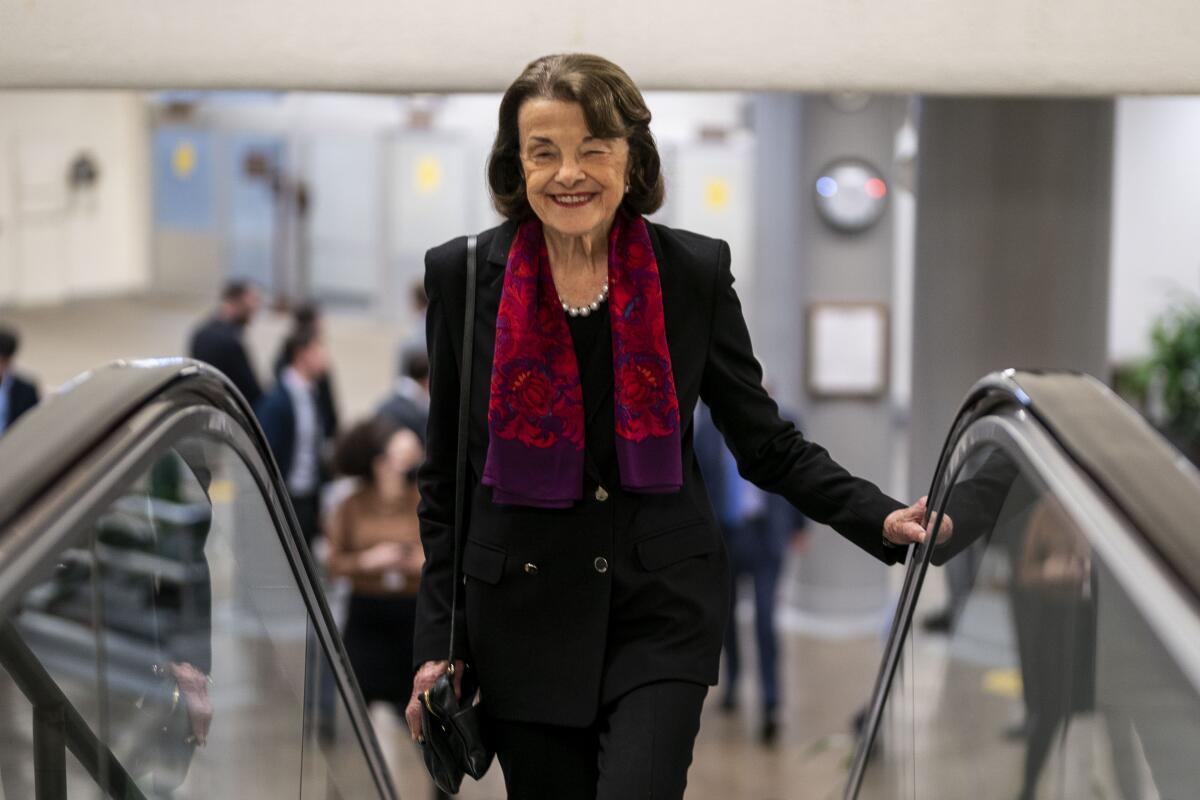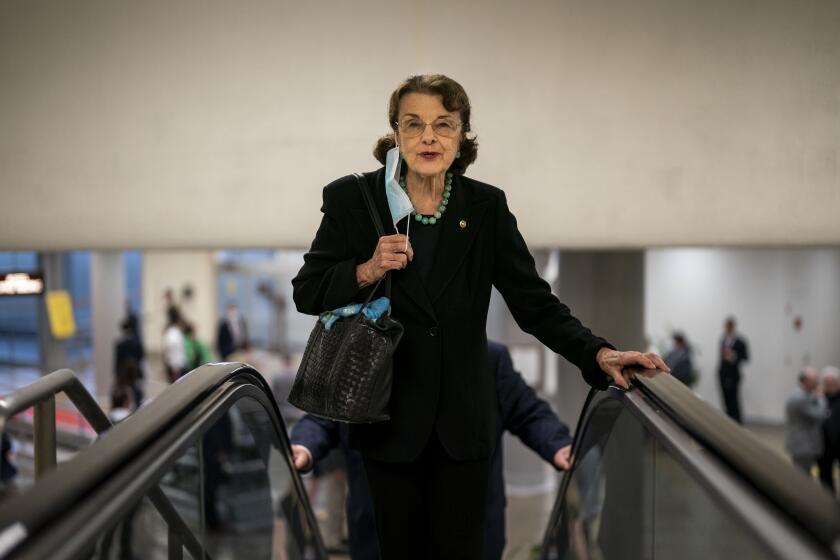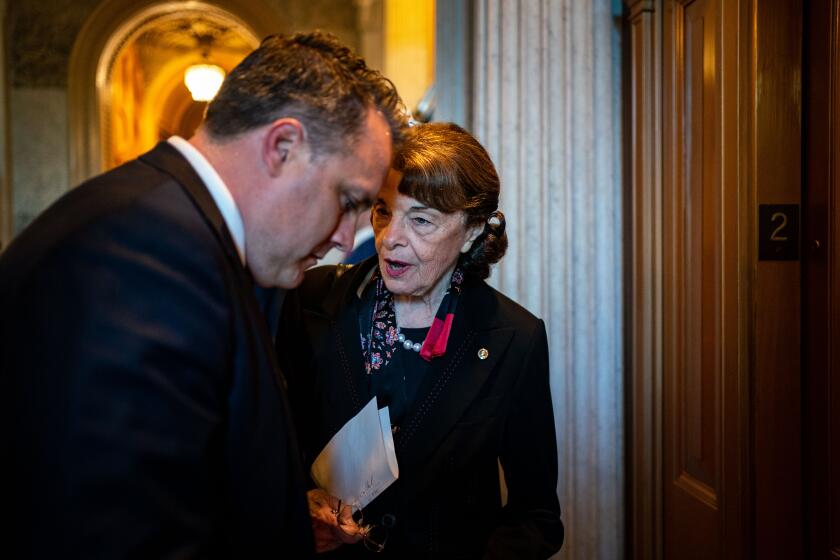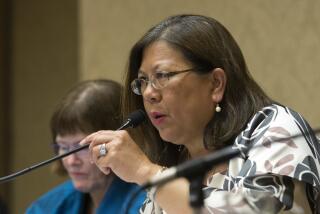Column: Feinstein won’t step down early. But when she does, these contenders have the best shot at her seat

SACRAMENTO — It’s not an election year, but in 2023 we’ll see a hot race begin for U.S. Sen. Dianne Feinstein’s seat.
These coveted Senate seats rarely open up in California.
Feinstein has occupied her office for 30 years — the longest Senate tenure in California history. She’s arguably the best California senator ever.
At 89, she’s also the oldest sitting U.S. senator. And age has caught up to her. There have been news stories about concerns regarding her cognitive agility.
Feinstein recently said she is still deliberating over whether to run for a sixth full term in 2024 and will decide “probably by spring.” But no one expects her to run. It’s inconceivable anyone close would encourage her to.
There has been speculation for two years that she might resign before her term expires. But the senator quieted that talk by also saying she “absolutely” intends to finish her term.
Good. She’s handling the job well enough with a skilled staff. And California has a second Democratic senator, Alex Padilla, 49, who’s energetic and rising in stature and effectiveness.
The main reason I’d like Feinstein to stay put is that if she left, Gov. Gavin Newsom would name her replacement — all by himself. That’s undemocratic. California voters should decide.
Dianne Feinstein suggested she has more work to do before leaving the U.S. Senate. “There’s still two years,” she said.
Newsom already appointed one senator, pal Padilla, to replace Kamala Harris when she became vice president. He also chose a replacement — then-Assemblywoman Shirley Weber — for Padilla’s previous elective office: California secretary of state. And he named then-Assemblyman Rob Bonta state attorney general to replace Xavier Becerra when President Biden tapped him to be secretary of Health and Human Services.
Enough’s enough. Those three selections may have been fine. But that’s too much one-man rule. Enable the electorate.
Newsom, 55, must soon decide whether he wants to remain in elective office after his second term expires in 2026 — and have a good launching pad for a potential presidential bid in 2028 or 2032. He has told Biden he won’t run in 2024 regardless of whether the president seeks reelection.
Feinstein’s seat is the only logical next elective office for Newsom. But he’d need to give up the last two years of his gubernatorial term to run in 2024 and wouldn’t want to — even if it is his only foreseeable opportunity to become a senator.
Newsom has never shown any interest in the Senate. He’d be just one of 100. But a senator has extraordinary power to deliver for the home state, the opportunity to acquire expertise in foreign affairs and the ability to draw national media attention, which the telegenic Newsom loves.
If Newsom wants to stay in politics — and in the limelight — a 2024 Senate bid is his best option.
Not everyone agrees.
“Californians do not take kindly to electing someone governor and 15 minutes later watching them run off trying to be president,” says veteran Democratic consultant Garry South. “Talk to Jerry Brown and Pete Wilson about that.”
Voters might look even less favorably on a governor running for the Senate.
So, let’s assume the 2024 Senate field does not include Newsom. Who does it include?
“It’s going to be a total free-for-all,” predicts Darry Sragow, a Democratic strategist and publisher of the California Target Book, which chronicles state elections.
But let’s be practical. Many possible candidates who are frequently mentioned won’t run. And if they do, they won’t get far.
Right now, I narrow the field of most promising contenders to four Democratic U.S. House members. And I divide them into two tiers: Adam Schiff of Burbank and Katie Porter of Irvine are the best bets. Barbara Lee of Oakland and Ro Khanna of Fremont have some potential for competitive bids.
Dianne Feinstein’s U.S. Senate seat will be on the ballot in 2024. Who are the contenders?
Schiff, 62, is the best known. He became a national Democratic star as the lead manager in former President Trump’s first impeachment trial. He has prominently chaired the House Intelligence Committee and sits on the panel investigating the Jan. 6, 2021, Capitol invasion by Trump-inspired insurgents.
A House member for 22 years, Schiff can grab attention without riling people. He’s articulate and cool — if short on flash.
Significantly, he has more than $20 million stashed in campaign seed money. He’s already quietly running behind the scenes, lining up potential support, but has been holding back publicly out of respect to Feinstein because she hasn’t announced her plans.
But South offers this observation:
“One political reality that may play into the race is gender. California was the first state in history to have two female senators” — Feinstein and Barbara Boxer elected in 1992. “That remained until 2021. The argument will be made that another woman should replace the only female senator remaining. I would be shocked if that doesn’t come into play.”
Enter Porter, 48, a rising star among Democrats.
Unlike Schiff, she is flashy and has gained national attention by taking apart chief executives during oversight hearings, often using visual aids such as whiteboards.
Porter says she’s “absolutely considering” a Senate race. One motivator is that her Orange County House district became more competitive when it was redrawn in 2021 and she barely beat her Republican challenger in November. She’s an unabashed liberal in a moderate district.
A prolific fundraiser, Porter has around $7 million banked for a Senate race.
Lee, 76, a 12-term House member, would be on Newsom’s short list if he were the selector. The governor has promised to appoint a Black woman if given the chance. But Lee seems too liberal for a statewide electorate, even in this blue state.
Khanna, 46, is another liberal and popular among ardent supporters of Vermont Sen. Bernie Sanders. Khanna also has his eye on a 2028 presidential race, but currently isn’t widely known outside his Silicon Valley district.
Other candidates probably will surface — including a politically inexperienced billionaire or two who foolishly think they can buy the seat.
More to Read
Sign up for Essential California
The most important California stories and recommendations in your inbox every morning.
You may occasionally receive promotional content from the Los Angeles Times.













